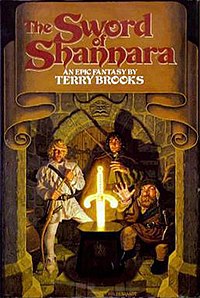 |
| Illustration by Greg Hildebrandt |
When I was 12, my dad handed
me The Sword of Shannara. He said that Terry Brooks was the man
that everyone in the 70s expected to succeed Tolkien.
Now cometh the question: 'Why are
you reviewing The Sword of Shannara? Isn't it a bazillion-and-one
times famous?'
Answer: ''Cause it's a book that
people dismiss, despite its popularity, as a rip-off of Tolkien.'
... And I'm writing this to argue differently!
It’s hard to go to university and
return to fantasy and science fiction books without becoming overly critical,
but the fact is that these books were immensely popular amongst both children
and adults. Fantasy in particular is about lifting the reader from mundane
reality so that they become the eyes and ears of a heroic figure, growing and
learning with them. Of course you can critique it on the ‘quality of writing’,
however unspecific that is, and compare it to Dostoyevski, but a story is more
than its words.
A story evokes something. A story captures the imagination of its reader, and if it does that ... well it’s a good book, isn't it?
The Sword of Shannara recalls Tolkien’s Middle Earth trilogy
in myriad ways without ever becoming offensive or clichéd. I want to say this
because every fantasy book ever published has 'THE NEW TOLKIEN AND BY GUM
SHE/HE'S BRILLIANT!' written by some reviewer on the back.
The book is set in a world that
has passed millennia beyond the final battles of humankind’s scientific arms
race. The technological world is gone, ne’er to return. Besides humanity, four
other races have appeared: Gnomes, Dwarves, Trolls and Elves. The intervening
time has mutated humans into Trolls, Gnomes and Dwarves and although they are
gifted with their Tolkienesque traits, they have a human life-span and are not
indicated to be all that different beyond body types. Elves are another matter
… it is indicated that 'elves have always been here'.
The story opens with Shea, a
half-elven orphan living with a tavern-keeper in a small isolated hamlet. Shea
is a stereotypical country boy, insular, marginally educated and eager to stay
that way. That is until the infamous Allanon, a man of mysterious heritage and
vast reserves of knowledge, blows into town with stories of a rising evil in
the northern lands. The evil, once a man called Brona, is a faceless power
identified only by the image of a Skull. The Skull Lord and his minions lie
behind the last two great wars that pitted race against race and destroyed the
once great civilisations of Earth. Allanon reveals that it is Shea who holds
the greatest chance of destroying Brona and saving the races of humanity,
through his blood-link to the greatest of heroes in history–the long dead elven
king Jerle Shannara, and through him to the magical sword that could bring about
Brona’s defeat.
Torn from their home, Shea, his
brother Flick and their flighty friend Menion find themselves joined by four
tough and warlike folk, the dwarf Hendel, the great prince Balinor and the two
elven brothers, Durin and Dayel. Together they trek north through a hostile
world filled with the dangerous mistakes of the ancient technological era. As they
travel, they find a land filled with enemies already amassing for war. The book
moves slowly at first, as the brothers Shea and Flick attempt to come to grips
with a world that they’d never imagined, but one-by-one the characters are
tested by the forces against them and their personalities begin to unfold.
As to the links between The
Sword of Shannara and LOTR, I would add that the greatest
similarity is also its greatest divergence. Tolkien, a religious man converted
to Christianity by C. S. Lewis, always wrote with the strength of biblical
mythology: the tests of Middle Earth were the tests of God in the final days as
the Fellowship fought under the banner of Eru against the demon Sauron.
Unlike Tolkien, there is no greater spiritual realm in Brook's world—where
Tolkien has Gandalf who always had a touch of the angels about him, Allanon is
a very human character: impatient, secretive, and quick to anger. He is driven
not by a compulsion to do good, but because he is haunted by guilt and his dead
brethren. He is not trusted even by his own party, Shea does not believe his
tales until he and his brother are driven from their home by a dark creature bearing
the icon of the Skull. Twist and turn, Allanon escapes apprehension by
characters and readers alike, he is a figure covered by an impenetrable black
cloak who holds knowledge that doomed an entire civilisation inside his head.
Unlike Tolkien, Brook’s classic
novel portrays a theme as thick and important as a taproot: both the mistakes
and the successes of this world are of human making, and only through our
acceptance of these failings can we fight to improve ourselves.
Other recommended books by this
author: The Elfstones of Shannara, Magic Kingdom for Sale [Sold]
No comments:
Post a Comment